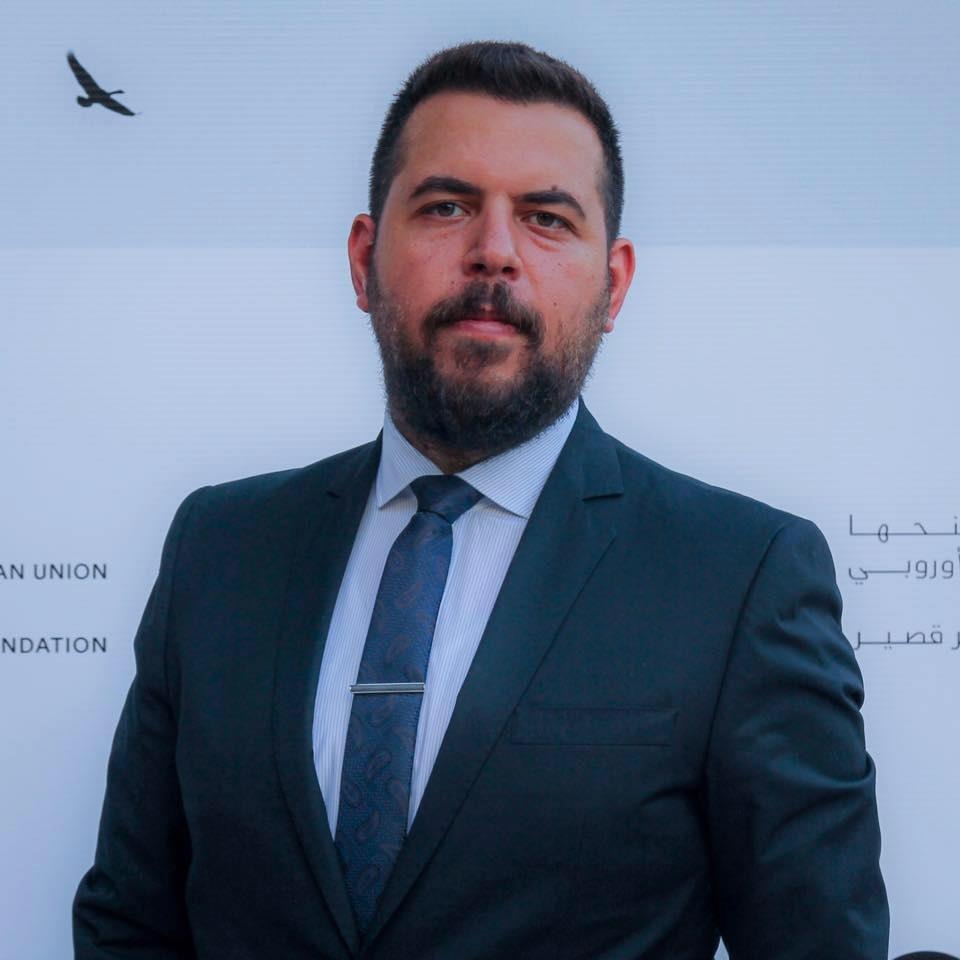شهد لبنان خلال السنوات الماضية تحوّلا كبيرا في مشهده الصحفي، فبعد أن كان البلد العربي الأعلى سقفا في حرية الصحافة، بدأ هذا السقف ينخفض تدريجيا بسبب التضييق المستمر من قبل السلطات على الإعلام والصحفيين. أن يُسجَّل في لبنان ما لا يقل عن 260 انتهاكا إعلاميا وثقافيا منذ 31 أكتوبر/تشرين الأول 2016 لغاية اليوم (1)، إشارة يجب الوقوف عندها بتمّعن. والمقلق هنا أن يصبح خبر اعتقال صحفي خبرا متكررا، في بلد يطرح نفسه كبلد ديمقراطي مميز عن بقية الدول العربية.
رصدت مؤسسة "سمير قصير" خلال عامين، صدور أربعة أحكام سجن بحق الصحفيين حنين غدار، وفداء عيتاني، وآدم شمس الدين، وميشال قنبور. وعلى الرغم من أن الأحكام لم تنجح في استكمال مسارها القانوني لأسباب مختلفة، فإن فكرة إصدار تلك الأحكام بحق الصحفيين بحد ذاتها كفيلة بدق ناقوس الخطر. كما تراجع لبنان على الأقل ثلاث مرتبات في مؤشر الحرية الصادر عن تقرير (2) منظمة "مراسلون بلا حدود" الأخير، فبعدما احتل لبنان المرتبة 98/180، ها هو اليوم في المرتبة 101/180.
في نظرة سريعة على المشهد الإعلامي بلبنان، تستنتج أنه ليس هناك "إعلام معارض" بالشكل التقليدي للإعلام المعارض الذي يتخذ صف العامة في وجه السلطة، فأغلب وسائل الإعلام المسموعة والمكتوبة والمرئية مملوكة للعائلات السياسية والاقتصادية في البلاد، كما أن أغلب الأحزاب السياسية خلقت منظومتها الإعلامية، وبالتالي فإن التمويل السياسي هو الحاكم الأول والأخير للخط التحريري لكل مؤسسة إعلامية في لبنان، والمال السياسي هو مدير تحرير غرف الأخبار فيها.
فمثلا، يتقاسم أسهم صحيفة "النهار" الوزير السابق مروان حمادة ورئيس الحكومة الحالي سعد الحريري، وطبعاً النائبة السابقة نايلة تويني. أما قناة "أن.بي.أن" (NBN) فتعود ملكيتها لمقربين من رئيس مجلس النواب الحالي نبيه بري ومسؤولين من حركة أمل، في حين أن جريدة "البناء" تتبع الحزب القومي السوري الاجتماعي، وقناة "المنار" لحزبَ الله، وقناة "أم.تي.في" (MTV) لرجل الأعمال والسياسي غابريال المر، و"إذاعة لبنان الحر" للقوات اللبنانية، وإذاعة "صوت الشعب" للحزب الشيوعي. أما صحيفة "الديلي ستار" فتعود ملكيتها لسعد الحريري مباشرة، بينما تتوزع أسهم صحيفة "لوريون لوجور" بين الوزير ميشال فرعون والوزير السابق ميشال اده. كما أن قناة "أل.بي.سي" (LBC) تعود أغلب أسهمها لبيار الضاهر وعائلة النائب السابق عصام فارس.
الأمثلة كثيرة ويمكن تصفحها على الخريطة التفاعلية التي أنتجتها مؤسسة "سمير قصير" ومنظمة "مراسلون بلا حدود" العام الماضي تحت عنوان "من يملك الإعلام اللبناني؟" (3).
غالباً ما تحمل هذه الوسائل الإعلامية أخبار الطوائف والعائلات السياسية التي تمثلها، أما الخبر الموضوعي الذي يراعي معايير المهنية الصحفية فهو رفاهية يمكن اعتبارها غير متوفرة في لبنان. يكفيك مثلاً الاطلاع على بعض الجمل المستخدمة في بعض وسائل الإعلام، لتلاحظ ارتباطها بالطوائف. وكمثال على هذه المفردات أو المصطلحات، يبرز لدينا مصطلح "الثنائي الشيعي" الذي يستخدم في الإعلام للدلالة على تحالف حزب الله وحركة أمل! غير أن التمويل ليس وحده من يحكم المؤسسات الإعلامية في سعيها نحو الاستقلالية، وإنما افتقادها للمحتوى الغني.
وبحسب مركز "سكايز" للدفاع عن الحريات الإعلامية والثقافية، شهد لبنان ما لا يقل عن 80 انتهاكا إعلاميا وثقافيا في العام الواحد. وتتنوع تلك الانتهاكات بين اعتقال وحجز ناشطين وصحفيين وفنانين استنادا إلى محتوى نشروه أو أنتجوه، بالإضافة إلى منع أفلام ومسرحيات، وفي أغلب الأحيان تدخل إخراجي من خلال حذف مشاهد أو تعديل كلمات.
كما لم يقتصر موضوع الاستدعاءات للصحفيين على الشكل الروتيني للحجز، فكانت هناك تجاوزات قانونية أهمها إجبار الصحفي (4) أو الناشط أو الفنان المحتجز على تسليم بيانات حساباته على مواقع التواصل الاجتماعي، وهو ما يرد في قانون العقوبات اللبناني (5)، وبالتالي فإن مثل هذه الإجراءات تقع أيضا في خانة الانتهاكات بحق الصحفيين، إضافة إلى ما يمارس من إجبار للمحتجز على توقيع (6) تعهد بعدم التعرض للجهة التي انتقدها! وهو ما لم يرد كذلك في القانون.
أضف إلى ذلك طبيعة الأحكام القانونية ضد الصحفيين، إذ إن محكمة المطبوعات محكمة جزائية، بينما يجب أن تكون المحاكم التي تنظر في قضايا الصحافة محكمة مدنية، فالصحفي ليس مجرمًا وإن ارتكب خطأ مهنيًّا.
في فبراير/شباط 2017، أصدر وزير العدل آنذاك سليم جريصاتي المحسوب على رئيس الجمهورية الحالي ميشال عون، قرارًا -بالاتفاق مع رئاسة الجمهورية ورئاسة الحكومة- يقضي بعدم التعرض لأي كان على مواقع التواصل الاجتماعي، منعًا للاعتقال الاستنسابي، إلا أنه من الواضح أن القرار كان شكليًّا.
من القصص المثيرة التي أثارت ضجة في لبنان، اضطرار الصحفي اللبناني فداء عيتاني لمغادرة البلاد بسبب التهديد الذي تعرض له من الأحزاب، وأحكام السجن ضده، فقط لأنه كشف أكثر من سياسي فاسد في الدولة.
مشهد آخر لا يحتمل في لبنان، وهو طريقة تطبيق قانون الاستدعاء، وذلك يرجع إلى كون بعض الأجهزة الأمنية محسوبة على أحزاب معينة، وبالتالي يسهل اعتقال الصحفي الذي تعرض لحزب معين من خلال الجهاز الأمني التابع للأخير.
يبدو أن المرحلة الحالية التي يعيشها لبنان خاضعة لمبدأ التماهي مع السلطة، على قاعدة "إن لم تشبهنا، التحقيق الأمني بانتظارك". لن تكون معادلة الاستقرار مقابل الحرية، معادلة مطروحة للنقاش حاليا. فالاستقرار الأمني لا يمكن أن يكون بدون ديمقراطية وحرية يتمتع بها جميع الفرقاء في لبنان.
المراجع:
* الصورة: محمد عزاقير - رويترز.








































